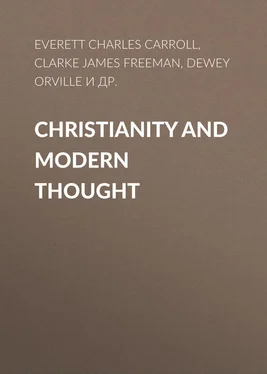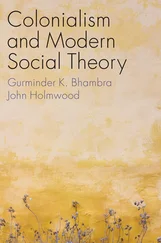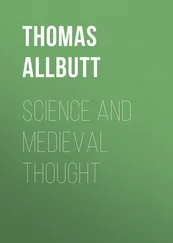Andrew Peabody - Christianity and Modern Thought
Здесь есть возможность читать онлайн «Andrew Peabody - Christianity and Modern Thought» — ознакомительный отрывок электронной книги совершенно бесплатно, а после прочтения отрывка купить полную версию. В некоторых случаях можно слушать аудио, скачать через торрент в формате fb2 и присутствует краткое содержание. Жанр: foreign_antique, foreign_prose, на английском языке. Описание произведения, (предисловие) а так же отзывы посетителей доступны на портале библиотеки ЛибКат.
- Название:Christianity and Modern Thought
- Автор:
- Жанр:
- Год:неизвестен
- ISBN:нет данных
- Рейтинг книги:5 / 5. Голосов: 1
-
Избранное:Добавить в избранное
- Отзывы:
-
Ваша оценка:
- 100
- 1
- 2
- 3
- 4
- 5
Christianity and Modern Thought: краткое содержание, описание и аннотация
Предлагаем к чтению аннотацию, описание, краткое содержание или предисловие (зависит от того, что написал сам автор книги «Christianity and Modern Thought»). Если вы не нашли необходимую информацию о книге — напишите в комментариях, мы постараемся отыскать её.
Christianity and Modern Thought — читать онлайн ознакомительный отрывок
Ниже представлен текст книги, разбитый по страницам. Система сохранения места последней прочитанной страницы, позволяет с удобством читать онлайн бесплатно книгу «Christianity and Modern Thought», без необходимости каждый раз заново искать на чём Вы остановились. Поставьте закладку, и сможете в любой момент перейти на страницу, на которой закончили чтение.
Интервал:
Закладка:
Some years ago the American Bible Society appointed a committee of the most learned scholars, from all Orthodox denominations, to correct the text and the translation of our common English Bible, so as to make it conform to the true Hebrew and Greek text. They were not to make a new translation, but merely to correct palpable, undoubted errors in the old one. They did their work; printed their corrected Bible; laid it before the Bible Society, — and that Society refused to adopt it . They had not the slightest doubt of its superior correctness; but they feared to make any change, lest others might be called for, and lest the faith of the community might be disturbed in the integrity of the Scriptures. Jesus had promised them the Holy Spirit to lead them into all truth, to take of his truth and show it to them; but they did not believe him. They preferred to anchor themselves to the words chosen by King James's translators than to be led by the Spirit into any new truth. So it is that "the letter killeth." It stands in the way of progress. It keeps us from trusting in that ever-present Spirit which is ready to inspire us all to-day, as it inspired prophets and apostles of old. It is an evidence not of faith, but of unbelief.
Thus, this false idea in Theology, that inspiration rests in the letter of a book or a creed rather than in its spirit, is seen to be opposed to human progress.
And then there is another Theology which is opposed to human progress. It is the Theology of Fear. It speaks of hell rather than of heaven; it seeks to terrify rather than to encourage; it drives men by dread of danger rather than leads them by hope. Its ruling idea is of stern, implacable justice; its God is a God of vengeance, who cannot pardon unless the full penalty of sin has been borne by some victim; whose mercy ceases at death; who can only forgive sin during our short human life, not after we have passed into the other world. To assuage his anger, or appease his justice, there must be devised some scheme of salvation, or plan of redemption. He cannot forgive of pure, free grace, and out of his boundless love.
Now those who hold such a Theology as this will apply its spirit in human affairs. It will go into penal legislation, into the treatment of criminals. It will make punishment the chief idea, not reformation. Jesus taught a boundless compassion, an infinite tenderness toward the sinful, the weak, the forlorn people of the world. He taught that the strong are to bear the burdens of the weak, the righteous to help the wicked, and that we are to overcome evil with good. When this principle is applied in human affairs, the great plague spots of society will disappear: intemperance, licentiousness, pauperism, crime, will be cured radically. Society, purified from these poisons, will go forward to nobler achievements than have ever yet been dreamed of. But this principle will not be applied while the fear-theology prevails, and is thought more of than that of love. The progress of human society depends on the radical cure of these social evils, not their mere restraint. And they can only be cured by such a view of the divine holiness and the divine compassion as is taught by Jesus in the Sermon on the Mount and the Parable of the Prodigal Son; showing the root of crime in sin, and inspiring a profound faith in God's saving love.
It may seem to some persons that I go too far in asserting that a true Theology is at the basis of human progress. They may ascribe human progress to other causes, – to the advance of knowledge, to scientific discovery, to such inventions as printing, the steam-engine, the railroad, and the like. But I believe that spiritual ideas are at the root of all others. That which one thinks of God, duty, and immortality, – in short, his Theology, – quickens or deadens his interest in every thing else. Whatever arouses conscience, faith, and love, also awakens intellect, invention, science, and art. If there is nothing above this world or beyond this life; if we came from nothing and are going nowhere, what interest is there in the world? "Let us eat and drink, for to-morrow we die." But if the world is full of God, – if we come from him and are going to him, – then it becomes everywhere intensely interesting, and we wish to know all about it. Science has followed always in the steps of religion, and not the reverse. The Vedas went before Hindoo civilization; the Zend-Avesta led the way to that of Persia; the oldest monuments of Egypt attest the presence of religious ideas; the Laws of Moses preceded the reign of Solomon; and that civilization which joined Greeks, Romans, Goths, Vandals, Franks, and Saxons in a common civilization, derived its cohesive power from the life of Him whose idea was that love to man was another form of love to God. "The very word humanity ," says Max Müller, "dates from Christianity." No such idea, and therefore no such term, was found among men before Christ came.
But it may be said that these instances are from such obscure epochs that it is uncertain how far it was religion which acted on civilization. Let us, then, take one or two instances, concerning which there is less uncertainty.
In the deserts, and among the vast plains of the Arabian Peninsula, a race had slumbered inactive for twenty centuries. Those nomad-Semitic tribes had wandered to and fro, engaged in perpetual internecine warfare, fulfilling the prediction concerning Ishmael, "He will be a wild man; his hand will be against every man, and every man's hand against him." No history, no civilization, no progress, no nationality, no unity, could be said to exist during that long period among these tribes. At length a man comes with a religious idea, a living, powerful conviction. He utters it, whether man will bear or forbear. He proclaims the unity and spirituality of God in spite of all opposition and persecution. At last his idea takes hold of the soul of this people. What is the result? They flame up into a mighty power; they are united into an irresistible force; they sweep over the world in a few decades of years; they develop a civilization superior to any other then extant. Suddenly there springs up in their midst a new art, literature, and science. Christendom, emasculated by an ecclesiastical and monastic Theology, went to Islam for freedom of thought, and found its best culture in the Mohammedan universities of Spain. Bagdad, Cairo, Damascus, Seville, Cordova, became centres of light to the world. The German conquerors darkened the regions they overran: the Mohammedans enlightened them. The caliphs and viziers patronized learning and endowed colleges, and some of their donations amounted to millions of dollars. Libraries were collected. That of a single doctor was a load for four hundred camels. That of Cairo contained a hundred thousand manuscripts, which were lent as freely as those in the Boston Public Library. The College Library of Cordova had four hundred thousand. In these places grammar, logic, jurisprudence, the natural sciences, the philosophy of Aristotle, were taught to students who flocked to them from all parts of Christendom. Many of the professors taught from memory: one man is reported to have been able to repeat three thousand poems. The Saracens wrote treatises on geography, numismatics, medicine, chemistry, astronomy, mathematics. Some, like Avicenna, went through the whole circle of the sciences. The Saracens invented pharmacy, surgery, chemistry. Geber, in the eighth century, could prepare alcohol, sulphuric acid, nitric acid, corrosive sublimate, potash, and soda. Their astronomers measured a degree of the earth's meridian near Bagdad, and determined its circumference as twenty-four thousand miles. They found the length of the year, and calculated the obliquity of the ecliptic. Roger Bacon quotes their treatises on optics. Trigonometry retains the form given it by the Arabs, and they greatly improved Algebra. We received from them our numerical characters. We all know the beauty and permanence of their architecture, and much of our musical knowledge is derived from them. They also made great progress in scientific agriculture and horticulture, in mining and the working of metals, in tanning and dying leather. Damascus blades, morocco, enamelled steel, the manufacture and use of paper, the use of the pendulum, the manufacture of cotton, public libraries, a national police, rhyme in verse, and our arithmetic, all came to us from the Arabs.
Читать дальшеИнтервал:
Закладка:
Похожие книги на «Christianity and Modern Thought»
Представляем Вашему вниманию похожие книги на «Christianity and Modern Thought» списком для выбора. Мы отобрали схожую по названию и смыслу литературу в надежде предоставить читателям больше вариантов отыскать новые, интересные, ещё непрочитанные произведения.
Обсуждение, отзывы о книге «Christianity and Modern Thought» и просто собственные мнения читателей. Оставьте ваши комментарии, напишите, что Вы думаете о произведении, его смысле или главных героях. Укажите что конкретно понравилось, а что нет, и почему Вы так считаете.












